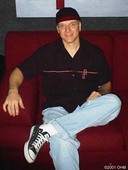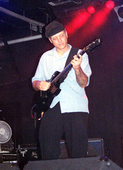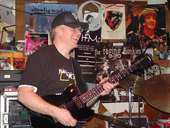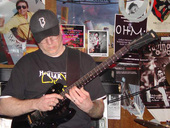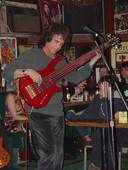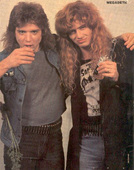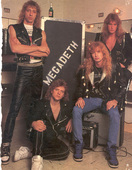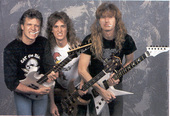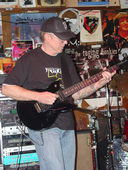Chris Poland
Power Of Resistance
23.03.2012
Архив интервью | Русская версия*** ARCHIVE ITEM - DATED 2004*** Doing an introduction to the interview with Chris Poland is one hell of a job, because there’s so much to tell about him. Chris became famous during his short, but fruitful tenure with Megadeth in the mid-1980s, and you can hear his guitar on the classic albums “Killing Is My Business… And Business Is Good” (1985) and “Peace Sells… But Who’s Buying” (1986). Later on Chris released a few solo records, including critically acclaimed “Return To Metalopolis” (1990) and put together a bunch of different bands, including Damn The Machine (progressive metal), Mumbo’s Brain (style hard to define) and his current instrumental fusion trio OHM. In addition to that, he recently got back together with Dave Mustaine to record guitar solos on the yet unreleased Megadeth record and did a few noticeable guest appearances. It’s no wonder that our transatlantic conversation lasted longer than one hour and still didn’t cover everything Chris-related. But hopefully you can still find some interesting info here…
(EDITOR'S NOTE - THE YEAR 2012: Those of our readers who have been following HeadBanger.ru for a long time are aware that the website was not born out of nothing. By the time it was established, all of our original authors had several years of experience with other Internet and print media. At that time we came up with a lot of materials, but, for various reasons, some of them are not available on the Internet at all at the moment, or are available in incomplete versions. The upcoming fifth anniversary of our webzine is the perfect moment to look back and put them online again. Why? First, because some of these conversations matter a lot to us personally. Second, we know that there is still interest in them on the side of our readers...)
We’d like to start with the latest events. Can you tell us a bit about the new Megadeth record? How many songs did you play on? How does the new stuff sound like?
I went down to Tempe, Arizona, to Dave’s home studio, for like three days, and it was a lot of fun. Luckily they had a great amp there, they had an old Marshall cabinet and a bunch of pedals, and I had a really great time doing solos. There’s a lot of really strong material on the record, it’s kind of “Rust In Peace”-type, but with a little bit of “Peace Sells” and a little bit of “Killing Is My Business”. I did eight electric guitar solos and one nylon-string guitar solo on it and I really enjoyed it.
Will you continue playing with Megadeth if Dave decides to start touring?
I guess if I have time. I’ve just signed a record deal for OHM with Frank Peterson of Black Note Records. He’s trying to get us out on the road, and we’re gonna do another record for him. I’m kinda tied up right now, we’ll see what happens.
How has Dave changed for the past, say, five years? And what can you say about his current guitar technique? He says he had to learn playing from scratch after his hand injury…
To tell you the truth, when I went to the studio with Dave, it was exactly like it was when we were doing “Peace Sells”, our working relationship was exactly the same. It was kind of like “try this!” – “do that!” – “go for this sound here!” It was really the same. He’s really the same person, just he’s sober, he has learned to deal with that stuff. And as far as his playing goes, it is as good or better than it’s ever been. The rhythm parts are amazing.
It seems that Dave has some kind of passion for jazz musicians, as a lot of people in Megadeth have jazz roots – you, Gar Samuelson, Nick Menza and now Vinnie Colaiuta. Do you know any reason for it?
(pause) Dave’s music is so more complicated, I would call it progressive, even from the first record, though maybe not towards the very end, they eventually got into more of a pop feel. But Megadeth’s a very progressive band. As far as drummers go, you always need that type of drummer. It just lands itself to having a guitar player that leans to that sort of playing.
Has Dave influenced you as a guitarist and songwriter in any way?
Actually when I made “Return To Metalopolis” I was very influenced by being in Megadeth and by Dave. But the thing that I carry with me even till today is something about his leadership quality. I try and take the good stuff that I see there, I try and use that when I’m trying to run my band. There was something about him that I noticed even when we were totally wasted – you always felt confident with whatever decision he was making, whether he’s out of his mind or not, do you know what I mean? There’s something about him, I’m trying to put my finger on it and tell you verbally what it is, it’s something that I try and emulate.
Speaking about OHM, why did it take you so long to find a record deal for this band in the States?
I wasn’t really looking to sign a deal. I was happy with what we were doing with Lion Music. Actually Peter Sardelich, who helped me co-produce the record, got together with a friend of his that worked at Black Note Records and said, “Hey man, what do you think of this band?” They came down to a couple of shows and said, “Hey, we wanna sign you guys! We’ve got worldwide distribution and stuff.” And plus they started a subsidiary label just to release our record, so I felt, “These guys are into it, let’s do it.”
Why did you choose the name “OHM” for the band? What does it mean for you?
OHM means resistance, and I’ve been resisting drugs and alcohol for about 16 years now. That was one thing. And my bass player has been sober for 17 or 18 years. Resistance meant a lot to us in that sense. Also it’s an electronic term that stands on home appliances and speakers and stuff like that. In addition, “ohm” is like a gem used in meditation. I don’t really meditate, but at that time, like five years ago, I was very into that whole thing, and it seemed something that I thought would work for us. It’s not that I’m a Buddhist, there’s just something about it that seems right. (laughs)
You’re about to release a live album (“Live On KPFK 90.7FM”), and as far as we know, it’s the very first live album that you’ve ever recorded. What kind of memories do you have about the recording process?
Oh my God, there was a lot of pressure. We didn’t realize the pressure until we got to the radio station, and they actually turned on us that we’re gonna play live in front of Los Angeles. There’s about 20,000 people listening to KPFK all the time. And all of a sudden Kofi (Baker, OHM drummer and son of legendary Ginger Baker of Cream – ed.) goes, “What do you mean?” And I said, “Kofi, all of Los Angeles is gonna be listening to this! For that matter, if you’ve got DAT work, the whole world’s gonna listen to it.” (everybody laughs) And that’s when Kofi went, “Ohh!” (laughs) We all kind of started waking up and going, “Holy shit!” Luckily we had an hour and a half to get our sound to the live board, and then get those left-right mixes into the broadcaster. There actually was exactly enough time, because right about the time we had to start, we were like, “Wow, we think that sounds OK.” We did it all with the headphones, we did the mix with headphones on us. We felt pretty confident it’s gonna sound good, we didn’t realize we’re gonna get a whole record, we thought we’d just get bonus tracks for other records, three or four tracks, out of this hour we played. But after listening to it we thought that the energy was strong enough that we had a whole record. There’s also a really cool kind of excerpt from a jam session that we had at KSPC, I think it’s 88.7, Tony Palkovic has a show every Wednesday, it’s a great jazz show, and if you have the Internet, you can visit www.kspc.org and get on it. Anyway, we did an hour over there, we played the same songs, but the recording quality wasn’t that good. Nevertheless, I wanted to use one of those songs as a bonus track for the KPFK record. So we took a jam session and put it on, it’s like an extended guitar solo, kind of Hendrix stuff, I like it a lot.
Can you tell us a bit about OHM’s upcoming studio album? What direction will you pursue?
I’m upgrading my studio right now, we made the last record in my studio, and we found out that we cannot plug microphones, we lack a little bit in our board. I’m kind of sound proofing the control a bit better, so I don’t get false low end. I felt like I was getting a lot of low end, I actually wasn’t, because the room was kind of boomy, and I thought, “Oh, my low end is really nice!” And I realized later that it wasn’t. Baker had the same problem recording the drums. So I’m working on the studio right now, and we’ll probably record the next record on and off in the next three months. It’s kind of easy for me because I own the studio, so when I have free time, I go there and record.
You recorded a solo on the latest album by the band Lamb Of God. How did this collaboration come about?
They just contacted me and said, “Hey man, will you do a solo on our record?” I wasn’t familiar with them, so I said, “If you send me a CD and let me hear it, I’ll let you know if I wanna do it or not.” When they sent me the song, I was like, “Holy shit! This is like Megadeth on steroids!” (everybody laughs) I was so greatly impressed that I was like, “I’ll definitely do this!”
You’re about to do one more session job, this time on an album by the Double Heart Project. What is this? What kind of music are they playing?
Journalists describe them as metal, it has a metal vibe to it, but I don’t mean metal like Megadeth, it’s… You have to listen to it, it’s good, but it’s not like in a Megadeth vein or in a Lamb Of God vein, it’s more verse-bridge-chorus kind of metal, but very well played and very well recorded, so it’s a nice record.
Generally speaking, what is required from a band that wants to have you as a guest on their record?
Well, they have to get hold of Steve Bauer and they have to submit whatever it is. Actually Steve’s not letting me play for free anymore! (cracks) He’s my manager, so be aware that he’s gonna ask you for some money. I did the Lamb Of God thing for nothing, because… I don’t know, I just did it. But from now on, everybody has to go through Steve Bauer.
You’ll also be playing on a tribute to Jimi Hendrix that Lion Music is putting together. What song did you choose to do? Was Jimi a big influence on you?
Oh my God, I can’t remember what the song it was, it happened so long ago. We did two Hendrix songs, I can’t remember which ones they were, but the solos came out really good. I hope you’ll get a chance to hear those, I really like them. Jimi Hendrix was a huge influence on me. You may not hear it in my playing, but “Band Of Gypsies”, the first two or three records, even all the way up to “Rainbow Bridge”, Hendrix was a huge influence.
When did you first hear his music? How old were you?
I think I was in sixth grade or seventh grade. I lived in a college town, and living in a college town, where there was a music college, was really beneficial, because a lot of the people who lived there had their fingers on the pulse of what was happening musically, and everybody’s older brother had every cool record you’d ever heard of. So you go over to these guys’ houses and just listen to the guys’ brothers’ record collection, and that’s how we got to hear a lot of music. I mean, I was listening to Mahavishnu Orchestra when I was in the seventh grade!
How did you feel about doing the “Guitarevolution” tour with Marty Friedman and having it billed as “ex-members of Megadeth”?
I didn’t mind it, that’s what people know me for. I thought it was great, I thought what Alex (Skolnick, ex-Testament, third member of the Guitarevolutiuon package) is doing was awesome. And then we were in the center, first there was Alex, then our band, and then Marty’s band. I thought it was a perfect sequence of volume and playing. It’s perfect because Alex’s doing a very jazz thing, we’re doing more like a jazz fusion thing, and Marty was doing a very very heavy rock thing. So I thought the whole thing was a really great idea, and as far as saying that me and Marty were ex-Megadeth, that’s most people know me for. Whatever you gotta do to get people to come and see me was OK with me.
Would you consider touring with any other ex-members of Megadeth?
You know, it’s kind of what we talked about before: right now my whole thing is the OHM band, it’s all I live and breathe right now. It would be hard for me to pull away from this OHM thing.
You’re gonna tour with OHM in April…
Yes, it’s March 30 through April 24 on the East Coast over here in America, and then we come back, Frank Gamballe wants to do the West Coast with us for a little while. We’re gonna try to get together with Marty and Alex again, but it’s really expensive trying to get Marty over, because Marty lives in Japan, and we have to get his band flown over, so whatever the circumstances are, I don’t think that’s enough money for Marty.
There were reports that the Guitarevolution tour was also supposed to feature Mike Albert Project, but it never happened. What was the reason?
I don’t know, I’ve never heard that.
In general, do you know Mike? Do you have any contact with him?
I’ve known Mike Albert since I first moved to California in 1977. He’s a great player. What’s strange is he was always kind of old-school Hendrix/Santana soulful guitar player, or heavy blues influenced. When he joined Megadeth he had to do the heavy metal thing, speed metal thing and stuff, but that’s not the kind of player that I’d known him as before. When I hear his new stuff I’m kind of confused, because it’s not who I’ve known him as. But it’s great nonetheless.
Can we go back a bit and discuss pre-Megadeth times? Before you joined Dave & Dave Jr. you and Gar Samuelson (the late Megadeth drummer) had a band called the New Yorkers. Did you make any recordings with this band?
We did make a couple of recordings, and Jay Jones who also was the original manager for Megadeth was our manager. He took those tapes, and we don’t know what happened to them. Jay’s no longer with us now, and I have no idea where any of those tapes are.
How about trying to resurrect some of these songs and record them now?
Me and Robertino (Pagliari, OHM’s bass player – ed.) have been thinking about that, because Robertino was the bass player in New Yorkers. It’s crossed our mind, because a lot of those songs had a lot of us in it. Maybe one of these days we’ll do a song called “Low Temperature Delay” that Gar wrote, it’s kind of close to our hearts, so maybe some day we’ll learn that just for Gar.
Speaking about Robertino, what was he doing all these years between the New Yorkers and OHM?
He was playing in a band called Divine Right, which was a heavy metal band that had a deal here in America in the early 1980s. He also played a little bit with Mike Albert doing blues stuff, but mostly he played with Bob Robles, who’s a jazz guitar player out here. He’s in a band called Buttermilk, which is Kofi Baker’s band. When I’m not playing OHM gigs, they play around town – Kofi, Bob Robles on guitar, and Robertino Pagliari on bass. Pag’s mostly a jazz player, and then he’ll do whatever else anybody can pay him to do.
How did you originally meet Gar?
Oh man, I met Gar back in New York. I was playing in a band called Pegasus, and Gar’s brother Stuart and him wanted to start a band, but they didn’t have anybody to play with. One day I was sitting in a restaurant, and Gar walks in – I’d never met Gar before – and he just started throwing joints on my table! (everybody laughs) I looked up, and he goes, “You’re Chris Poland, right?” I said, “Yeah!” And he threw another joint on my table and said, “Come with us right now, let’s jam!” (everybody laughs) So I went, and that’s how I met Gar.
Do you know where the famous “Choose ‘Deth” B.C. Rich guitar is today?
Oh man, I wish I knew! That was a really nice guitar, it was a mahogany neck and mahogany body. I don’t know what happened to it. The last person I know that even saw it is the guitar player that played in Megadeth right after I left, Jay Raynolds, who played in a band around town here that was actually a really big band, they were called Malice. He is the last guy to see that guitar. I haven’t seen him since then! (laughs)
Megadeth’s “Peace Sells…” album has two songs – “Devil’s Island” and “Good Morning/Black Friday” which are credited as inspired by Deejon Carruthers, who was the first drummer in Megadeth. Do you know what the story behind those songs is? In which was Deejon actually inspired Dave to write those tracks?
Well, I never knew him. The story that I heard was that “Devil’s Island” is about the movie “Papillion”. That’s what all I knew it was inspired by. As far as “Good Mourning/Black Friday” is concerned, I seem to remember Dave talking about a horror fiction novelist called Lovecraft that he was very inspired by. These are the only two things I remember about anybody that was given credit for inspiring a song by Dave. I’ve heard it in interviews and so. But I can be wrong.
What do you think about the remixed version of “Killing Is My Business…” released a couple of years ago?
Oh, that’s amazing! I feel very good about that. The quality of the original recording compared to the remix that they did is amazing. Have you heard the remixed version of “Peace Sells”?
Unfortunately, not yet.
When I went down to do the recording for the latest record, Dave took me aside and said, “Hey, do you wanna hear the remixes for “Peace Sells”, the real remixes from the 24-track recordings?” I looked at him like (imitates a surprised voice), “What?” “Yeah, I’ve just remixed the record!” He put it on, and I’m telling you men, it sounds amazing. He backed the reverb of the drum. It’s like some guy came in and remixed the record after Randy Burns mixed it, and Capitol totally soaked it in reverb. We always felt that it had too much reverb on it. Now Dave took care of that problem. The reverbs are really natural, he mixed them as a soundboard, it sounds great!
Does the remixed version of “Killing Is My Business” represent your original vision of the record that you had in 1985?
(pause) We didn’t have a lot of time to make that record. Having heard it remixed like that, I can’t say it’s my vision, or how I wanted it to be or not be, it’s just however it was, it as great and as good as a representation that you’ll ever hear.
You’ve just said that some guy remixed “Peace Sells” after Randy Burns. What was the reason?
Capitol Records did buy the record from Combat, and they told us they’re gonna remix this and make it sound like Dave thought it needed to sound. But Capitol Records didn’t know anything about speed metal. Dave’s got it sounding right now, so you can hear the guitars, you can hear the kick-drums, you can hear everything, nothing’s washed out at all. It’s really really nice! Why Capitol Records took it and remixed it, I have no idea.
What do you think about Randy Burns? What were your impressions from working with him?
He’s a great producer, I wish he was still in the music business, though he may be, for all I know. When I worked with him on “Return To Metalopolis”, he was right there, always giving me the right advice. Some of the advice I didn’t follow, I should have, and I learned my lesson. There’s a lot of things I learned from that working situation, when I should have listened to him, and I didn’t. Now I’m trying to reflect that in whatever I’m recording.
It’s known that Dave asked you to return to Megadeth in 1989, and you played on the demos for “Rust In Peace” (1990). How many songs were recorded during those sessions? Could you shed more light on this period of your career?
We had gotten together, we had talked about maybe working together again. And at the same time as we were talking, Enigma wanted to give me a record deal for “Return To Metalopolis”, that same week they offered me a record deal. I think I played on four songs on the “Rust In Peace” demos, but I couldn’t turn down Enigma’s proposal, because it was like, “Here we wanna give you a record deal to do what you wanna do.” Actually it was Capitol Records that offered me a deal, and right after that the A&R; department was fired from Capitol. And then about two weeks later Enigma picked up the record, they bought the whole contract, and I made the record. To this day, I don’t feel bad about it, it’s what I wanted to do. Megadeth went on and it was good with or without me.
What’s your opinion on the released version of “Rust In Peace”?
It’s awesome! That’s a great record!
How much do the songs on the released version differ from the demos you played on?
Oh, I haven’t heard those! I played the demos and I never even heard them back. We kinda just talked, and then we split and I never heard them since the day I recorded them. I can’t even remember how the original demos went.
Nowadays Dave is promising a lot of bonus tracks on re-releases of the Megadeth back catalog. Is there any chance that these demos will become such bonus tracks? Do you know whether he has these demos?
I think he does. I remember enjoying the songs and having fun playing them, so who knows what they sound like, I hope they sound good.
We did an interview with Mike Albert by e-mail last year, and he said the second Megadeth album was supposed to be a live album. According to him, the band wanted to do it to get rid of the contract with Combat. Do you have anything to comment on that?
Ehm… No, I don’t remember. All I remember is that we went in, recorded the record for Combat, and as soon as we did it, Capitol Records came in and said, “We wanna buy this band from you.” Part of their (Combat’s) contract was, “As long as we can keep our logo on your records, we don’t care.” I think even to this day Combat Records has its logo on the back of Megadeth records.
Most of the tape traders state that your first gig with Megadeth was on December 28, 1984. Is it correct?
The first gig I ever did was at L’Amours in New York, opening for Slayer. That was the first gig I ever did with Megadeth. I joined the band three weeks before we recorded the first record. We recorded that album in The Garage with Karat Faye. My first gig was probably six months before the record came out, it usually takes about three or four months for a record to be released.
When was the last show that you played with Megadeth? Did you know that it was your last show in advance?
I think it was at Hawaii during the “Peace Sells” tour. I didn’t know it was my last show, but we were sick, I mean physically sick from heroin, we couldn’t take it anymore, I couldn’t take it anymore. I actually flew home early the day after the show, and the next thing I knew was I could feel that it has fallen apart.
What is your favorite Megadeth song?
(pause) My favorite Megadeth song is “Hook In Mouth”.
And what about the ones that you played on?
I really like “The Conjuring”, I like “Devil’s Island”, of course I like “Peace Sells”, I like “Rattlehead”… I like them all, but those are my standouts.
Let’s pass on from Megadeth to the next stage of our career – a punk band called Circle Jerks. How was it like being in the punk rock atmosphere as opposed to the metal scene in Megadeth?
It was great! I was finally sober, I think I was a year sober, I learned like 32 songs. It was really strange – my last gig with Megadeth was in Hawaii, and a week before I went on tour with Circle Jerks I learned all their songs while I was in Hawaii! (everybody laughs) It was a lot of fun, we were doing 30-32 songs in a set, there were so many songs that I couldn’t remember the titles. Keith Morris would go, “Alright, now we’re gonna do “Junk Mail”!” And I would go, “Junk Mail”?” (everybody laughs) But what a great band it was! Just check out “Casualty Vampires” from the “VI” record, it’s a great record men! I can’t believe it!
How much violence was there at Circle Jerks concerts? We’ve heard from Dead Kennedys that violence was very common for punk concerts in America in the mid-1980s…
It wasn’t really bad. If we did 40 shows, about every 20 shows there would be something radical that happened. We played in Texas, and some punker, a skinhead guy, had a straight razor and was running around cutting everybody while he was doing this punk rock dance shit! And we were like, “What’s going on?!” Shit like that would happen once in a while.
Was your tour with Circle Jerks your first experience as a bass player? Or had you already played bass for a long time before?
I always was like a classic bass player, I was very into Jaco Pastorius and Stanley Clarke. Playing bass in Circle Jerks was way different than that, but I felt I had enough grasp of the instrument, so I could play.
Why did you leave Circle Jerks so quickly?
It’s because I already had the “Metalopolis” record written, and I was, “You know, I really wanna start doing this.” Around that time I got together with my brother, and we started working on the album.
Are you still into punk rock in any way?
(pause) I still like Fear, I still like Circle Jerks, some Sex Pistols songs, a little of The Clash. Mostly those are my favorite punk bands. I don’t really listen to a lot of stuff anymore, I’m more trying to write songs and keep my mind open, I’m just waiting for songs to come.
As long as you mentioned Fear, what do you think about the MD 45 project that Dave Mustaine did together with Fear singer Lee Ving?
I’ve heard of it, but I don’t think I’ve ever heard the record.
How was it like going solo and working on “Return To Metalopolis”?
You know what? It’s the 20-20 vision, when you’re looking back you always have 20-20. When I was going in to make the record, because I had just played bass for Circle Jerks, I thought, “Oh, I can handle the bass on this record.” That was the thing that even Randy Burns had mentioned, he said, “One thing we’re lacking here is that we have one mind playing all the string instruments.” What it leads to is you tend to go down the same road, which you don’t wanna do. I wasn’t playing bass the way a real bass player would. One thing that happened when I got together with Robertino was he has all that stuff that only a bass player would know. The bass playing is bred in them, it’s part of their genes how to go to certain notes, they know to play a certain rhythm, a certain section, and that’s something I didn’t have. I wish I did back then. That was weird. Otherwise it was great – being able to go in there and record your own stuff, it was a lot of fun.
In Megadeth you were a member of the band, but on the “Metalopolis” you were on your own. How much different was that?
(pause) Well, it became a band eventually. The band eventually became Damn The Machine. But I understand what you’re saying, I know the question you ask… (pause) There was no interaction. Me and my brother knew what we wanted to do and we did it, but this wasn’t like four guys in the room jamming on a song and going, “How do you wanna get to this chorus? What if we try this here?” There weren’t a lot of ideas being jammed around, there were just my ideas, while in Damn The Machine everybody had their say to try an idea here and there. That adds life to a project. But on the other side of the same point, I still think that “Return To Metalopolis” is a really strong record. It’s just that you do get the feeling that it’s just me and my brother. I don’t know how to describe it except that it sounds like it’s the drummer and the guitar player that did this record. But because of that it has a unique sound anyway.
In a continuation of the previous question: when you were in Megadeth, did you work with Dave or for Dave?
A little bit of both. A lot of time Dave would say, “Can you do a harmony here?”, like in “Peace Sells” – “Can you play the harmony part here? Can you think of a harmony here? Do you have an idea?” But mostly all of the writing was Dave’s. I don’t know if David Ellefson wrote anything except for a bass line here and a bass line there. It was all basically Dave’s stuff. That’s what kind of led me to go and do my own thing. Writing-wise there was nowhere to go in the band, and I didn’t write that way anyway, do you know what I mean? I didn’t think that way, and I don’t think that I could ever, you have those two records, just listen to the writing on those records, it’s mind-bugling. The thing was that I couldn’t participate in that writing, because I don’t come from that writing style. And it wasn’t until after I left the band that I thought, “Maybe I can mix my writing style with the heaviness that I learned from playing with Dave.” That’s what I did. But in Megadeth I didn’t really get a chance to really fulfil any kind of writing aspiration.
Your next step after “Return To Metalopolis” was Damn The Machine. It was again a band. Did you want to get this band feeling, this interaction back again?
I felt like I wanted to play with a vocalist, I wanted to play more of familiar songs, I needed to hear vocals again. And I got kind of a bad taste to my mouth trying to play instrumental music and having all the Megadeth fans come to see me play. I actually felt confused, because I didn’t feel like they were getting it. It wasn’t like I was hurt or anything, some nights it was great, and some nights were just like, “turn off the headlights”. My brother Mark also felt like trying to get a band together. We got a bass player, Dave Randi was our bass player from “Metalopolis”, and so we felt, “Let’s get a really good front guy that can sing and play guitar in our time signatures.” So we found Dave Clemmons. That was a lot of work, a lot of suffering, just as much as there were good times. When we got dropped from that label (A&M; – ed.), we felt like we didn’t wanna pursue that same band again. I don’t wanna get into why, it just wasn’t happening. It’s just that personality-wise things weren’t working out for everything so…
What is your brother Mark now doing? Does he still do music?
Yes, he plays piano and sings. He’s a songwriter, he’s in a band called Fester in LA. You can go to his website at www.festervision.com , it’s kind of experimental stuff like David Bowie meets Nine Inch Nails, he uses white props on stage, he’s definitely going for visual as much as audio art.
And what about the rest of Damn The Machine members?
Dave Randi actually stopped playing for a while, but now he’s playing jazz stuff with his dad. But mostly he does computer programming for Playboy Magazine now. Dave Clemmons has a band called Full Bliss, his girlfriend plays violin in the band, I’m sure it’s pretty good. He has released some stuff in Germany with a band called Jud, there was a couple of songs that I like. I’d like to hear this Full Bliss stuff, because I don’t get a chance to get out and see him.
As you recently re-released “Return To Metalopolis”, are there any plans to re-release the Damn The Machine stuff?
I would love to re-release that record, it’s just that we don’t own the rights to it. A&M; does, and they don’t care to re-release it. Why – I don’t know.
In addition to the full album, Damn The Machine also released a promo-CD called “Five For Silence” (1994) with some cover versions on it. What tracks did it contain? We only know that there were covers of King Crimson and Ten Years After…
There was “I’d Love To Change The World” by Ten Years After, “Cat Food” by King Crimson, “Mr. Soul” by Neil Young, and a Hendrix tune called “Will I Live Tomorrow”. We did one other song, I just can’t remember what it is.
Was it just a promo CD, or were there any copies sold?
Our A&R; guy at that time, Brian Huttenhower, he was also an A&R; guy for Soundgarden, Gin Blossoms and so on, was trying to get us to do a B-sides single that might get us more radio airplay, and then maybe would add to the record, to give it some more lights. For some reason, that record just didn’t go anywhere. I felt like there was a wrong single, I wanted to use “Lonesome God” for our first single, but A&M; was like, “Oh no, we gotta go with “The Mission”, it’s so poppy!” But anyway, it’s still a great record.
After the demise of Damn The Machine you started a new band called Mumbo’s Brain. Your website lists a CD called “Excerpts From The Book of Mumbo” (1995). Is it a full-length CD or an EP? We’ve never seen it on sale…
It was basically just an EP that we were selling at shows, some of the songs on my “Rare Trax” CD (2000) were on “Excerpts From The Book Of Mumbo”. I just wanted to release those songs, and then eventually some day I might want to release all of that.
“Rare Trax” also contains a few songs by another band that you had – Nothing If Not. There is very little information on it…
Carol McArthur was the vocalist, Dave Randi on bass, and Koko Bernejo was our drummer, who eventually became the first drummer for OHM. That project is very close to my heart, I really like a lot of the songs, I loved the way that Carol sang, and we played everything live and then overdubbed the vocals and the guitar solos. Basically all the rhythm tracks – bass, drums and guitar – are live, because all I had was a four-track recorder. I don’t know why, I just really enjoyed that music. I don’t listen to it all the time, but when I really put that CD on where I did those songs, I feel really close to them. I don’t know why, I just do. Carol is a great vocalist, she’s got a band in town right now, they’re trying to get a record deal.
Did you make any more recordings with Nothing If Not, or only these five songs?
We had three other songs recorded, but the quality was so bad we couldn’t release them. One of those songs is called “To God,” it’s basically a song for Jaco Pastorius, one more song is called “If I Fell”, which is just like a pop rock song, and “Higher” was another song. It never blossomed, it never seemed like it was ever gonna be anything more than just us getting together and writing songs to a tape machine, but I feel that this band had a lot of soul to it.
Did you ever talk to Gar Samuelson about Megadeth before his passing? Did he reflect on his time in the band or his thoughts on the later released music?
(starts speaking with great difficulty) I saw Gar two days before he passed away. He felt the same way that I feel about our time in Megadeth – it was great, he was very proud of what he added to the band, what he brought to the table. He followed that right down until he passed away with his band that he had with his brothers down in Florida. (pause) It’s hard to talk about Gar.
Can you tell us a bit more about the musical projects that Gar was involved after his departure from Megadeth? His career outside Megadeth and Fatal Opera is not very well known over here…
Fatal Opera made two records. I can’t remember the title of the first record, the second one was called “The Eleventh Hour”. I felt they were a great band, mostly because Gar’s drumming was phenomenal, but still his brother was a great guitar player. I didn’t feel like they got a chance to do anything, the reason why was that Gar got sick. They made the first record, did some touring on the East Coast, and by the time they went in to make the second record, none of us knew this, but Gar was going sick. I used to call Gar once a week, and every week I would call him, I could hear in his voice that he wasn’t well, but I didn’t know he was sick, he never told anyone. I would talk to his brother Stuart, and he was like, “Yeah, Gar doesn’t wanna tour, I don’t know what to do here, we don’t tour with this band, nothing’s gonna happen…” I felt bad, because I didn’t know why Gar didn’t wanna tour until I found out three months later what was going on. That’s kind of a sad story, because they were such a good band, and they never got a chance because Gar passed away. (pause) Anybody who listens to Megadeth should definitely listen to Gar’s playing on those records, because his playing is amazing.
We remember that at Woodstock on April 25, 1999 (just 11 days after Gar’s passing – ed.), Dave dedicated the song “Peace Sells” to Gar…
Yeah, I’ve heard this. Gar was such a… there’s no words that can describe how we all felt about Gar.
OK, let’s move on, we apologize for touching upon such a sad theme. Are you into the present-day guitar scene? Can you recommend us any young guitarist that you consider worthy of attention?
(pause) I don’t have my finger on the pulse of that stuff right now, I just have the guys that I like to listen to, and those guys are like Scott Henderson… I kind of listen to some older stuff, today I was listening to the first Pat Martino record, I like to listen to “Joyous Lake” by Pat Martino. Sometimes I listen to Jon Abercombie, but as far as new players, there is one guy that is kind of in the Pat Martino vain. I haven’t picked up his record yet, but a friend of mine at the Big Potato has mentioned that I need to find it in a store. I’m trying to remember his name right now, but I can’t! As far as this thing goes, I’m kind of out of it.
We’d like to ask your opinion about some of the artists somehow related to Megadeth. Let’s start with Nick Menza. What do you think of him and his music? Do you know him personally?
I know him personally, not like on a super-personal level, but I think Nick’s a great drummer. He actually rehearses down in the building that our studio is in, so I see him once in a while. What else can I say? He was in Megadeth, so he’s a great drummer. Maybe if there is a reunion, I hope that Nick will play drums on it.
As long as you are in the same building, have you ever jammed with him or something like that?
Nothing like that, but we did play together on those demos for “Rust In Peace”.
One more drummer - Jimmy DeGrasso…
Oh, yeah, Jimmy, what a great guy! He was playing drums for Marty’s band when we were on tour. He’s really solid.
The next one is a guitarist, Al Pitrelli.
You know what? I’m not familiar with a lot of his stuff. I kind of liked what I heard, but I would need to listen to more, because I only heard him play on the single (“Moto Psycho”, if we understand correctly – ed.), and it’s just one song. But like I said before, I don’t even think I bought that record.
What do you think about Cacophony?
You know, I’ve never heard Cacophony. I know it’s Marty and Jason Becker, but I’ve never sat down to listen to it. That’s something I’ll definitely have the pleasure of hearing someday.
One more band – Kublai Khan.
Who?
It’s the band run by Greg Handevidt, the original second guitarist of Megadeth.
I’ve heard of the band, but I’ve never heard their music though.
What has been the most memorable day in your musical career?
(pause) That’s tough! (laughs) I think the most memorable day was the day we played Joe Louis Arena (in Detroit on February 13, 1987 – ed.) with Megadeth, opening for Alice Cooper, where I realized just how big the thing had become. That was the day that still sticks in my head, it was great. I remember there were 20,000 people standing in front of us! And we were like, “Holy shit!” (laughs) That’s with that band, but I have other memorable days with Ohm. I think one of the most special things I remember was when we were still with Koko Bernejo and we opened for Deep Purple in House of Blues (in Chicago – ed.). The band came in and told us that we were really great and thanked us for opening for them! We were like, “Wow!” That was very nice of them. Ian Gillan came in our dressing room and was like, “Great job, guys! I really liked you!” And as he closed the door I looked at Pag and was like, “Holy shit!” Guys like that don’t come in your dressing room, guys like that are like, “Leave me alone, I don’t wanna talk.” (everybody laughs) So I was very happy.
In retrospect, do you think that your hand injury was a kind of blessing in disguise?
I will say yes, I do, I think it is. That led me to playing in a different way, I can’t play any way but this way, and I have a feeling that it gave me the style I have, because of how I have to play. All the influences that most guitarists have, you can also hear in my music, they are Jeff Beck, Alan Holdsworth, Jimi Hendrix, and Dave Mustaine or whoever, but through all of that there’s something going on that gives me a certain tonality or sound that I feel may be a part of it. I don’t even think about it anymore. Sometimes we play something in front of a mirror, when they have mirrors in the dressing room, if I look up and see myself playing a guitar in a mirror than I kind of freak out. I realize that my hand looks really weird. And then I have to stop thinking like that, because if I’m looking on my hand while I’m playing the set and I start realizing what my fingers look like, then I would drop the ball, I can’t concentrate.
Is there any chance to see you on tour in Europe some time soon?
Oh God I hope so! We’ve been talking about coming to Europe for four years. We really wanna do it, we’re just waiting for Lion Music to help us get over there. I want Lars (Eric Mattson, owner of the label – ed.) to make us get over there somehow. It’s not like we wanna make a million dollars, we just wanna play there. Hopefully someday…
It seems like you’ve never played any concerts in Europe…
Not with this band. With Damn The Machine we had a great tour in Europe, we opened for Dream Theater. When you guys were asking about my best musical moments, there’s one more – when we opened for Dream Theater in Hamburg, we played two nights there. The first night we played, the audience was freaking out so bad that we did an encore! Those guys said, “Come on now, let’s play another song!” I didn’t realize we will have our asses kicked! (laughs) But the audience was freaking out, it looked like they wanted us to play another song, so we did!
Chris Poland on the Internet: http://www.chrispoland.com
Enormous and heartful thanks to Susie Walker and Rob Shay for helping us with this interview
Felix Yakovlev, Roman “Maniac” Patrashov
February 15, 2004
© HeadBanger.ru
